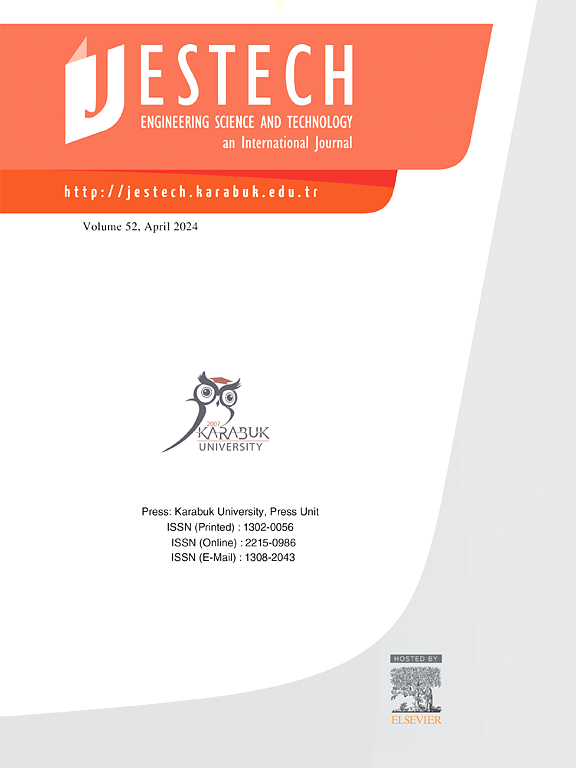新的区块链共识算法在医疗行业的应用:访问证明- (POV)
IF 5.1
2区 工程技术
Q1 ENGINEERING, MULTIDISCIPLINARY
Engineering Science and Technology-An International Journal-Jestech
Pub Date : 2025-03-04
DOI:10.1016/j.jestch.2025.102014
引用次数: 0
摘要
世界人口的增长、技术进步、基因研究、数字健康服务和医疗设备是导致电子健康记录(EHR)快速增长的原因之一。卫生服务、临床研究、公共卫生研究、健康保险数据、卫生研究和类似来源产生了大量的电子病历。当今的一个重要问题是数据存储在集中式数据库系统中,并且只有通过这些中心才能确保数据的准确性和安全性。由于这些中心之间的通信和集成问题,由于难以访问EHR,检查和实验室测试等重要数据可能会重复。由于公民不能完全控制共享自己的电子病历,这种情况可能会导致医疗保健流程中的缺陷和中断。未经公民同意共享个人电子病历可能会导致数据隐私问题。在集中存储患者数据的系统中,软件更改可能会导致患者数据丢失等问题。病人的潜在有价值的电子病历是次要的,这一事实导致了数据的不规则维护。凭借其分散的架构和验证机制,区块链技术可以比集中式结构更有效地工作,而不会出现数据丢失或安全问题。在本研究中,建议使用区块链基础设施共享电子病历,并专门为区块链上的健康数据准备共识算法。这样,个人电子病历存储在患者自己的控制和他们自己的健康钱包中。本文章由计算机程序翻译,如有差异,请以英文原文为准。
New blockchain consensus algorithm applied on healthcare industry: Proof of Visit- (POV)
The increase in the world’s population, technological advancements, genetic research, digital health services, and medical devices are among the reasons that lead to the rapid growth of Electronic Health Record (EHR). Health services, clinical studies, public health studies, health insurance data, health research, and similar sources generate a large amount of EHR. One of today’s important issues is the storage of data in centralized database systems and the fact that data accuracy and security are only ensured through these centers. Due to communication and integration issues between these centers, vital data such as examinations and laboratory tests can be repeated due to difficulty accessing the EHR. As citizens do not have full control over sharing their own EHR, this situation can cause deficiencies and disruptions in the healthcare process. Sharing personal EHR without the citizen’s consent can lead to data privacy issues. In systems where patient data is centrally stored, software changes can cause problems such as loss of patient data. The fact that the patient’s potentially valuable EHR is secondary causes irregular maintenance of the data. With its decentralized architecture and verification mechanisms, blockchain technology can work more efficiently than centralized structures without data loss or security problems. In this study, it is proposed to share EHR using blockchain infrastructure and to prepare a consensus algorithm specifically for health data on the blockchain. This way, personal EHR is stored in the patient’s own control and their own health wallet.
求助全文
通过发布文献求助,成功后即可免费获取论文全文。
去求助
来源期刊

Engineering Science and Technology-An International Journal-Jestech
Materials Science-Electronic, Optical and Magnetic Materials
CiteScore
11.20
自引率
3.50%
发文量
153
审稿时长
22 days
期刊介绍:
Engineering Science and Technology, an International Journal (JESTECH) (formerly Technology), a peer-reviewed quarterly engineering journal, publishes both theoretical and experimental high quality papers of permanent interest, not previously published in journals, in the field of engineering and applied science which aims to promote the theory and practice of technology and engineering. In addition to peer-reviewed original research papers, the Editorial Board welcomes original research reports, state-of-the-art reviews and communications in the broadly defined field of engineering science and technology.
The scope of JESTECH includes a wide spectrum of subjects including:
-Electrical/Electronics and Computer Engineering (Biomedical Engineering and Instrumentation; Coding, Cryptography, and Information Protection; Communications, Networks, Mobile Computing and Distributed Systems; Compilers and Operating Systems; Computer Architecture, Parallel Processing, and Dependability; Computer Vision and Robotics; Control Theory; Electromagnetic Waves, Microwave Techniques and Antennas; Embedded Systems; Integrated Circuits, VLSI Design, Testing, and CAD; Microelectromechanical Systems; Microelectronics, and Electronic Devices and Circuits; Power, Energy and Energy Conversion Systems; Signal, Image, and Speech Processing)
-Mechanical and Civil Engineering (Automotive Technologies; Biomechanics; Construction Materials; Design and Manufacturing; Dynamics and Control; Energy Generation, Utilization, Conversion, and Storage; Fluid Mechanics and Hydraulics; Heat and Mass Transfer; Micro-Nano Sciences; Renewable and Sustainable Energy Technologies; Robotics and Mechatronics; Solid Mechanics and Structure; Thermal Sciences)
-Metallurgical and Materials Engineering (Advanced Materials Science; Biomaterials; Ceramic and Inorgnanic Materials; Electronic-Magnetic Materials; Energy and Environment; Materials Characterizastion; Metallurgy; Polymers and Nanocomposites)
 求助内容:
求助内容: 应助结果提醒方式:
应助结果提醒方式:


